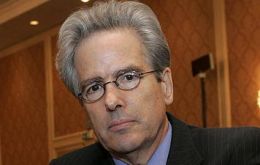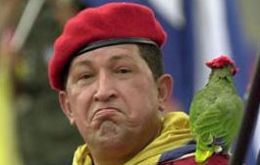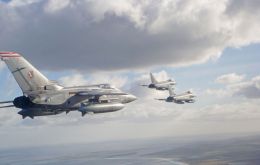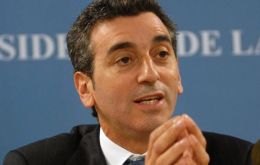MercoPress. South Atlantic News Agency
Politics
-
Saturday, June 5th 2010 - 05:52 UTC
Uruguay plans to sell 1 billion US dollars of bonds next year

Uruguay plans to sell about 1 billion US dollars of bonds next year, including 500 million of dollar- denominated debt, said Carlos Steneri, director of public credit at the Ministry of Economy and Finance.
-
Saturday, June 5th 2010 - 05:28 UTC
Uruguayan president Mujica only asset is a 1987 VW Beatle

Uruguayan president Jose Mujica, 75, formally declared to the Transparency and Public Ethics commission that his entire wealth amounts to a 1987 Volkswagen Beatle valued at about 1.900 US dollars.
-
Saturday, June 5th 2010 - 05:16 UTC
IMF ‘emergencies department’ to visit Hungary next Monday

The IMF is sending a senior official to Hungary for talks with the new government early next week, amid rising concerns about the country's public finances.
-
Saturday, June 5th 2010 - 00:59 UTC
US government says there’s no arms race in the Americas

The US government does not consider that there’s an arms race in the Americas and estimates the majority of countries invest more on social areas than in military hardware said Assistant US Secretary of State for Hemispheric affairs, Arturo Valenzuela.
-
Saturday, June 5th 2010 - 00:51 UTC
President Lula da Silva admits he would consider running again in 2014

Brazil’s president Lula da Silva confirmed he is seriously considering running again in 2014 when Brazil will be hosting the World Football Cup. The Brazilian president made the announcement during an interview with Bandeirantes television.
-
Saturday, June 5th 2010 - 00:47 UTC
Venezuela’s Chavez the less convincing leader for Paraguayan ‘twitters’

A “twitter” opinion poll organized by Paraguay’s main daily newspaper ABC Color to evaluate which Latinamerican presidents are most rejected or less convincing delivered several predictable results but also some surprises.
-
Saturday, June 5th 2010 - 00:41 UTC
Cuba among the most flagrant human rights abusers, says Freedom House

Freedom House released on Thursday ‘Worst of the Worst 2010: The World’s Most Repressive Societies’, its annual report identifying the world’s most flagrant human rights abusers. at a side panel during the 14th session of the UN Human Rights Council.
-
Friday, June 4th 2010 - 19:02 UTC
Falklands’ thick fog forces two RAF Typhoons and tanker to land in Punta Arenas

Two Royal Air Force Euro Typhoon fighters and their Vickers VC10 refuelling tanker had to land Wednesday afternoon in Punta Arenas, extreme south of Chile, because of adverse weather conditions in the Falkland Islands Mount Pleasant Airport.
-
Friday, June 4th 2010 - 05:11 UTC
Mounting pressure in Argentina for Justice to order removal of pickets

Pressure is mounting in Argentina for pickets blocking an international bridge leading to Uruguay to be ordered removed by a court order, following Wednesday’ presidential summit when Uruguay’s Jose Mujica and Argentina’s Cristina Fernandez de Kirchner agreed on a joint agenda of pending issues.
-
Friday, June 4th 2010 - 05:07 UTC
G-20 challenge: how to reduce deficits and not kill incipient economic recovery

Disagreements over how quickly to reduce inflated budget deficits and restore balance to the global economy risk will be one of the main issues to be addressed at the high-level Group of 20 talks this week in South Korea.
